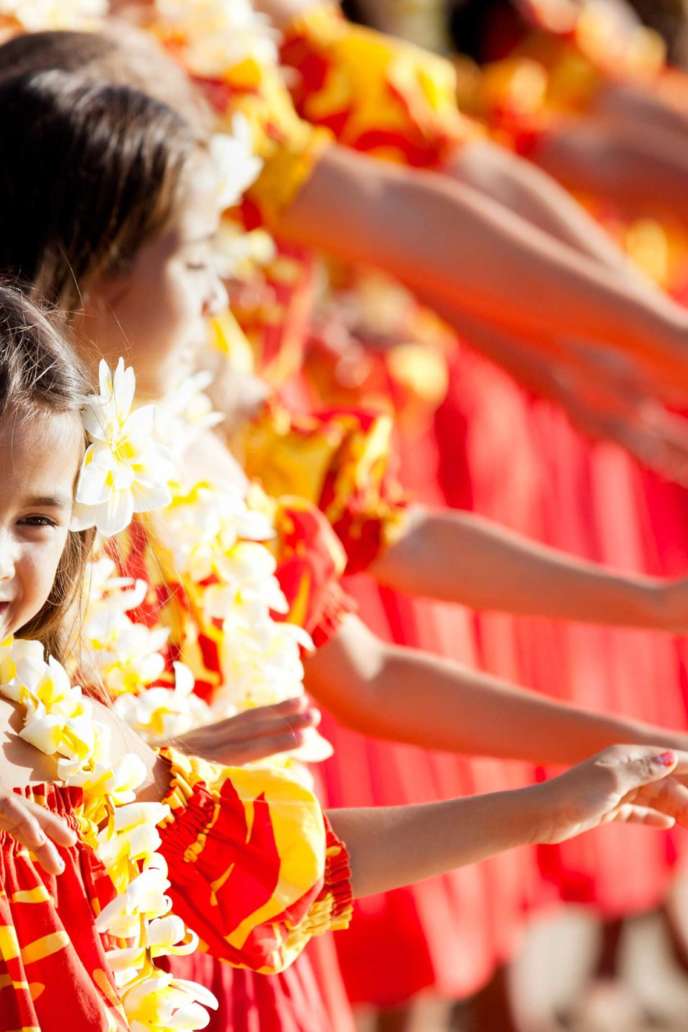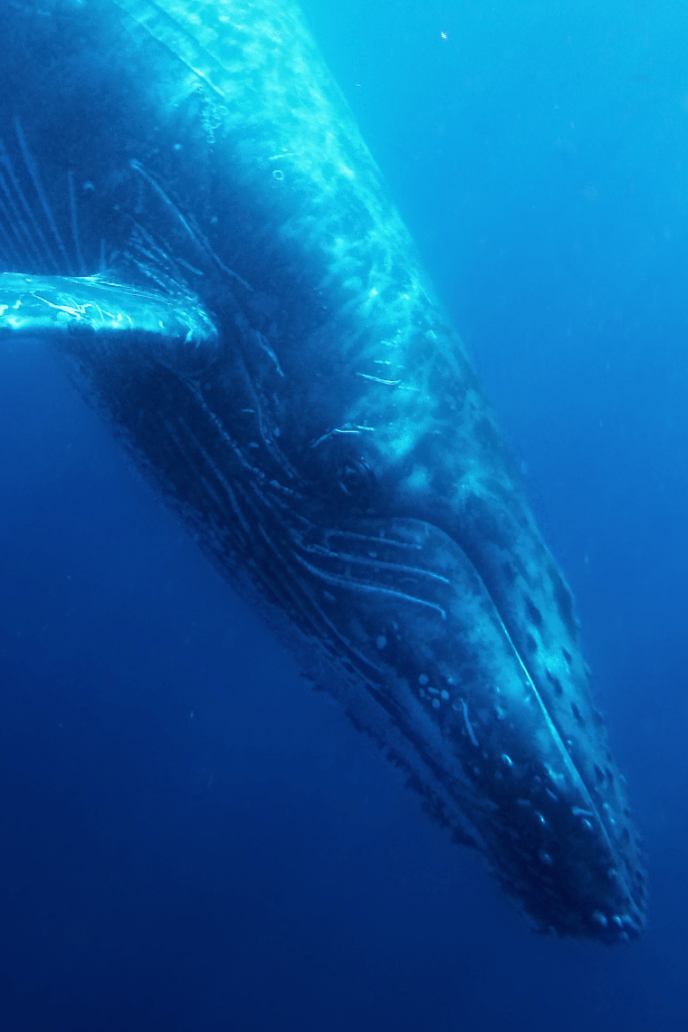Hawaii’s allure extends beyond its stunning natural landscapes to encompass a rich tapestry of cultural traditions, with luaus being one of the most recognizable. Originating from the indigenous Hawaiian culture, Luaus represent more than a feast – they are a deeply embedded cultural ritual infused with symbolism and meaning. This article delves into the cultural significance of luaus, beyond the vivid spectacle of hula dancers and fire knife performances, to encapsulate the deeper essence of Hawaiian heritage that continues to resonate in every echo of the ukulele.
Traditional Components and Symbolism in Luaus
A traditional luau carries profound symbolism and comprises numerous components, each carrying its unique significance. Each element of a luau, from the food to the dances, is a nod to a cultural heritage that reveres the land (‘aina’), the ancestors (‘aumakua’), and the spirit of community and shared respect (‘aloha’).
The Kalua Pig and its Significance
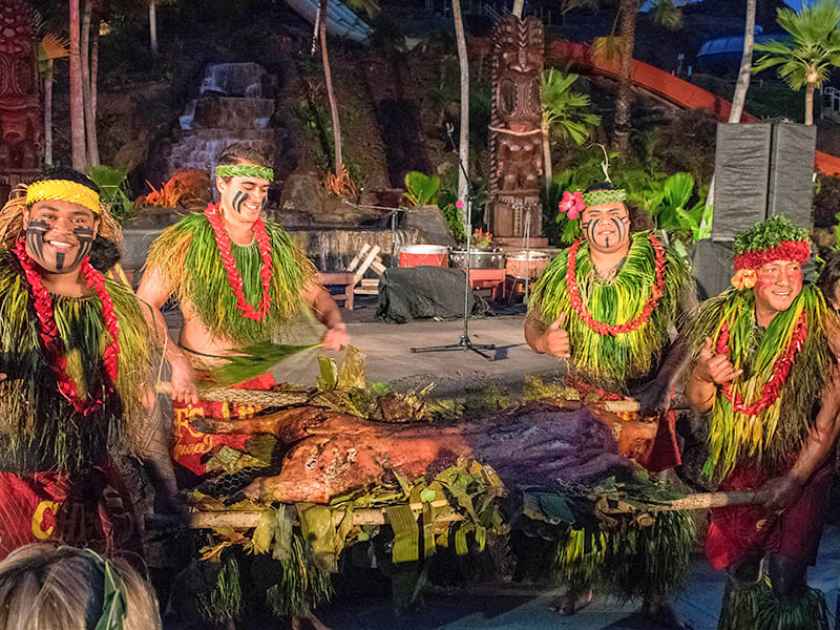
The centerpiece of a traditional luau feast is the kalua pig. This dish, prepared through a unique cooking method, symbolizes the deep-rooted connection that Hawaiians have with the ‘aina, or land. The pig is generously salted, wrapped in banana leaves, and then slow-cooked in an “imu” – an earth oven dug into the ground. This cooking process, which can take up to eight hours, imbues the pork with a smoky, irresistible flavor that is distinct from Hawaiian cuisine. Beyond its gustatory appeal, the Kalua Pig represents the generous bounty of the land and the Hawaiian tradition of sharing this abundance with family, friends, and guests. Participating in a luau and partaking in the Kalua Pig is a nod to the island’s rich culinary traditions and the Aloha spirit that sustains it.
The Role of Hula Dancing and Hawaiian Music
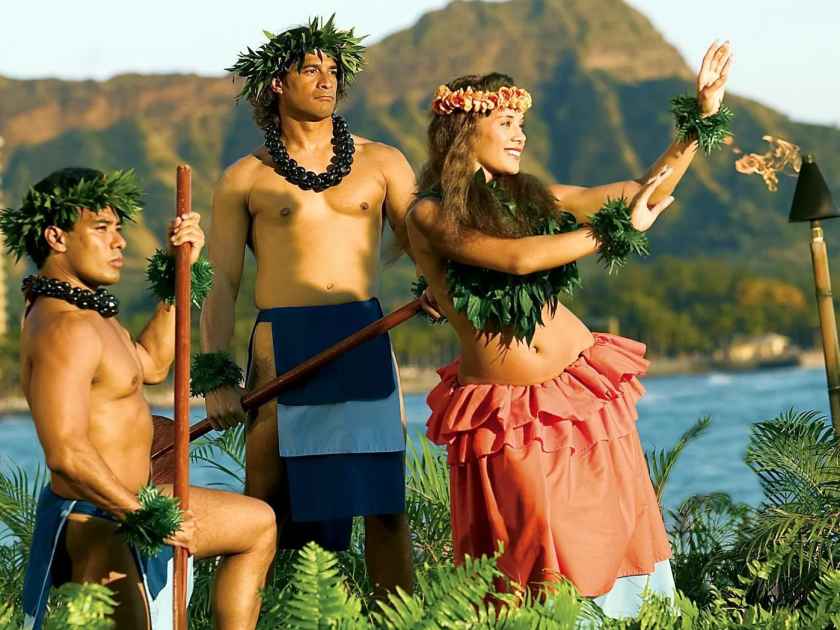
Hula dancing and Hawaiian music are integral elements of a luau, serving as the rhythmic heartbeat that brings the celebration to life. Hula, more than just a dance, is a powerful form of storytelling, using graceful movements to narrate the sagas of gods, legends of heroes, and tales of love. Each sway of the hip, gesture of the hand, and expression on the dancer’s face convey a portion of the story, making the viewer an active participant in the unfolding narrative. Hawaiian music complements the hula, providing the melodic backdrop against which these stories are told. Traditional instruments such as the ukulele and slack-key guitar produce a distinct, vibrant sound that captures the spirit of the islands. Together, hula dancing and Hawaiian music encapsulate the essence of Hawaiian culture, ensuring the legacy of the island’s rich history is carried forward in each luau celebration.
Cultural Importance of Leis
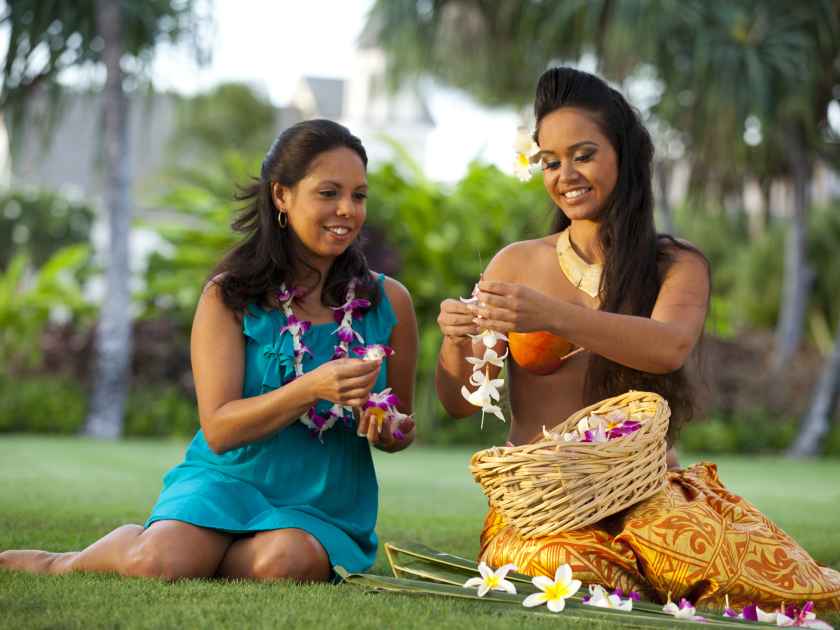
The lei, a garland or wreath strung together with flowers, leaves, shells, seeds, nuts, or feathers, holds profound cultural symbolism in Hawaiian tradition. Originally used by ancient Polynesians and Hawaiians to distinguish ranks and roles, and as peace offerings between opposing tribes, leis have evolved to represent the spirit of Aloha. In a luau, the exchange of leis signifies a warm welcome, respect, and love for the receiver. Each element used in a lei carries its meaning and significance, adding depth to this beautiful gesture. The lei is more than a decorative garland; it’s a tangible expression of Hawaiian hospitality and communal bond, seamlessly woven into the fabric of luaus and broader Hawaiian culture.
Luaus as a Celebration: Events and Occasions

Luaus are not just confined to major cultural events or tourist attractions; they are a popular way to mark significant life milestones and occasions in Hawaii. From birthdays and graduations to weddings and anniversaries, luaus provide a framework for celebration that is quintessentially Hawaiian. The sense of community, the cultural performances, and the sharing of a communal meal all combine to make these occasions memorable. For tourists, attending a luau offers a dynamic, immersive experience that encapsulates the spirit of Hawaiian hospitality and culture. Major hotels and resorts in Hawaii often host luaus, providing guests with a taste of the island’s rich cultural history and vibrant present. Whether marking a personal milestone or immersing oneself in local culture, luaus are a colorful, joyous testament to the enduring appeal of Hawaiian traditions.
The Evolution of Luaus in Modern Times
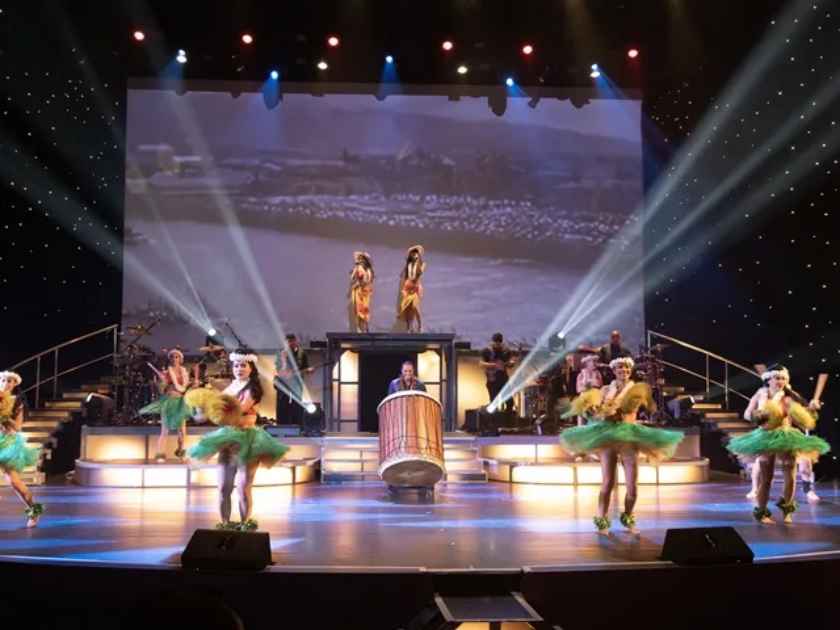
The enduring appeal of luaus is evident in their continued popularity, not just in Hawaii, but globally. Over time, luaus have evolved to accommodate modern sensibilities, becoming a significant part of Hawaii’s tourism industry. While remaining rooted in tradition, luaus have adapted to include contemporary elements. Today, professional luau companies host grand events featuring extravagant buffet spreads, fire knife dancing, and performances by award-winning hula halau (troupes). A testament to their flexibility and relevance, modern luaus also cater to various dietary requirements, with menus offering vegan and gluten-free options alongside traditional Hawaiian dishes. Despite these changes, the essence of luaus remains unchanged – they continue to be a celebration of ‘ohana, joy, and the spirit of Aloha. In the age of globalization, luaus serve as a vibrant reminder of Hawaii’s rich cultural heritage, while continually adapting to the dynamic rhythms of the present.
Luaus and Tourism in Hawaii: Preserving Cultural Integrity
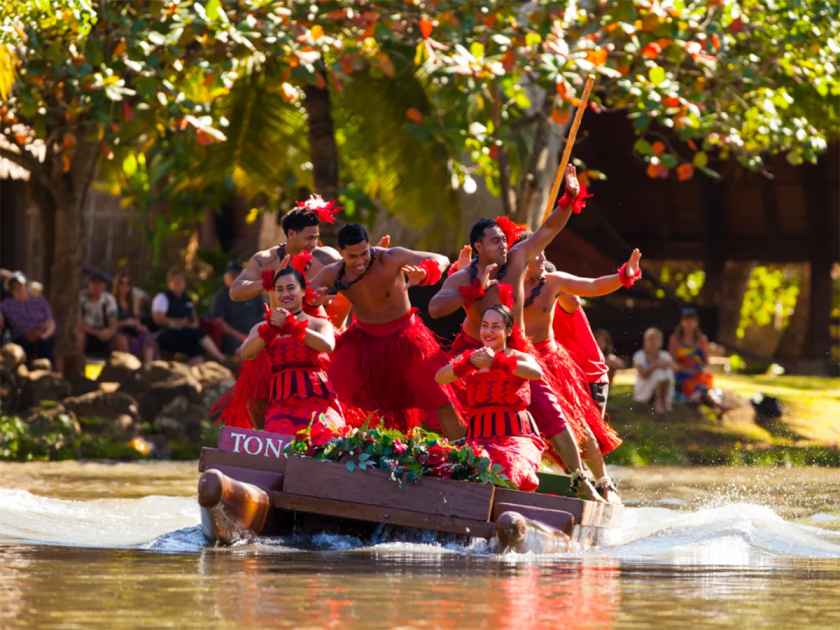
Tourism is a significant economic driver in Hawaii, with luaus serving as a vibrant attraction for visitors worldwide. While these feasts offer a taste of Hawaiian culture and history, they also pose a challenge – maintaining cultural authenticity amidst commercial appeal. As luaus gain global recognition, the imperative to preserve their cultural integrity becomes paramount. This involves ensuring that the traditional components – the food, music, dance, and storytelling – remain true to their roots, even as they adapt to a modern, tourist-friendly format. Effective cultural preservation necessitates a careful balance, respecting and honoring the past while embracing the evolving present. For this, local communities, cultural practitioners, and event organizers play a crucial role in shaping the way luaus are held today, safeguarding the rich heritage they embody while sharing the spirit of ‘Aloha’ with visitors far and wide.
The Future of Luaus: Sustainability and Adaptation
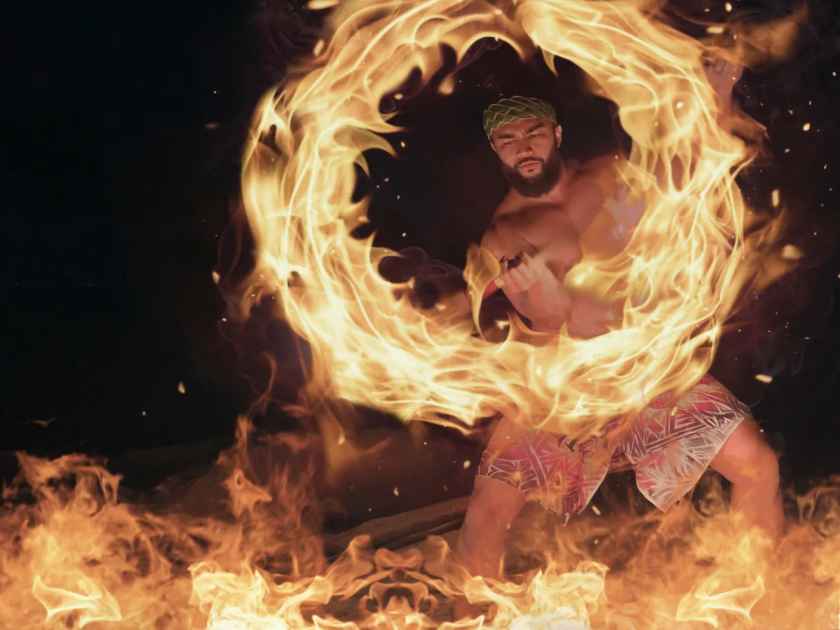
As we look to the future, luaus are poised to continue their evolution, balancing a respect for tradition with the need for sustainability and adaptation. There’s a growing consciousness among event organizers to make luaus more sustainable. This shift can be seen in practices such as sourcing locally grown ingredients for the feast, reducing waste, and promoting the use of reusable materials for serving food and drinks. This not only supports local agriculture but also minimizes the environmental impact.
Furthermore, adaptation is key as Hawaii’s cultural ambassadors strive to keep the tradition alive amid a rapidly changing world. There’s an increasing use of digital platforms to share this rich cultural experience with people who can’t physically attend a luau. From virtual luaus to online hula lessons, these adaptations ensure the essence and teachings of luaus continue to reach and inspire people worldwide, preserving the cultural integrity of Hawaii while promoting a global sense of ‘ohana. The future of luaus is thus envisioned as an enduring celebration that cherishes the past, embraces the present, and looks forward to a sustainable, inclusive future.
Through Luaus, the World Gets a Glimpse of the Hawaiian Culture
As we reach the end of this cultural exploration, it’s clear that luaus serve as a vibrant thread interweaving the past, present, and future of Hawaii. The shows highlight the island’s rich culinary heritage, captivating dance forms, and a spirit of community that extends beyond its shores. Luaus remind us of the power of tradition, symbolizing the resilience and adaptability of Hawaiian culture in the face of change. They continue to foster a sense of unity and mutual respect, embodying the ‘Aloha’ spirit that is integral to Hawaiian identity. As they evolve and adapt to modern times, luaus undoubtedly retain their cultural integrity, ensuring that the heartbeat of Hawaii’s cultural heritage continues to resonate with each generation. Luaus are testaments to an island that warmly embraces its past, celebrates its present, and looks forward to its ever-evolving future.



